Czy kiedykolwiek próbowałeś otworzyć jeden ze swoich postów WordPress tylko po to, aby zostać powitanym przez błąd 404? Czasami doświadczamy tego, gdy pracujemy nad własnymi witrynami WordPress lub pomagamy naszym użytkownikom.
Błąd ten pojawia się, gdy można uzyskać dostęp do obszaru administracyjnego WordPress i bloga, ale przy próbie otwarcia konkretnego posta pojawia się komunikat “404 Not Found”.
Pozorne zniknięcie treści może być frustrujące, ale znaleźliśmy kilka obejść, które poprawią ten problem. W tym kompletnym przewodniku pokażemy, jak poprawić posty WordPress zwracające błędy 404.
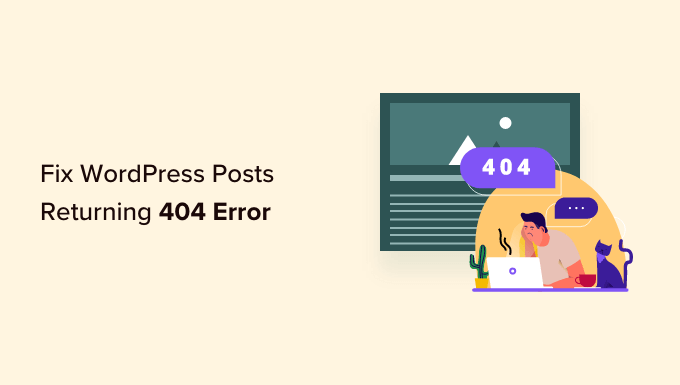
Dlaczego moje wpisy na WordPressie zwracają błąd 404?
Istnieje kilka powodów, dla których Twoje posty mogą wyświetlać błąd 404 “Nie znaleziono strony” w WordPress. Mogą one obejmować:
- Konflikty wtyczek lub motywów: Czasami wtyczki lub motywy, które zainstalowałeś na swojej witrynie, mogą zakłócać sposób, w jaki WordPress obsługuje bezpośrednie odnośniki. Może to prowadzić do niedziałających odnośników i błędów 404.
- Problemy z własnym kodem: Jeśli dodałeś niestandardowy kod do swojej witryny internetowej, mogą występować błędy w kodzie, które mają wpływ na bezpośrednie odnośniki lub powodują inne konflikty, powodując błędy 404 dla twoich wpisów.
- Problemy z plikiem .htaccess: Plik .htaccess odgrywa rolę w strukturze adresów URL WordPress. Jeśli plik ten jest uszkodzony lub go brakuje, może to prowadzić do błędów 404 dla postów lub stron.
Jak znaleźć wszystkie posty WordPress z błędem 404?
Zanim przejdziemy do rozwiązań, dobrze byłoby dowiedzieć się, czy ten błąd występuje tylko w jednym lub dwóch postach, czy w wielu postach. W ten sposób można określić zakres problemu i wybrać najbardziej odpowiednie rozwiązanie.
Jednym z łatwych sposobów, aby to sprawdzić, jest skorzystanie z Google Search Console. Jeśli jeszcze nie przesłałeś swojej witryny do Google Search Console, przeczytaj nasz przewodnik na temat dodawania witryny WordPress do Google Search Console.
Gdy bot Google zaindeksuje Twoją witrynę, Google Search Console dostarczy Ci szczegółowych informacji o jej wydajności, w tym o napotkanych błędach 404.
Aby dowiedzieć się, które posty zwracają błędy 404, możesz zalogować się do kokpitu Search Console. Następnie przejdź do raportu “Strony”, a zobaczysz szczegółową listę wszystkich błędów.
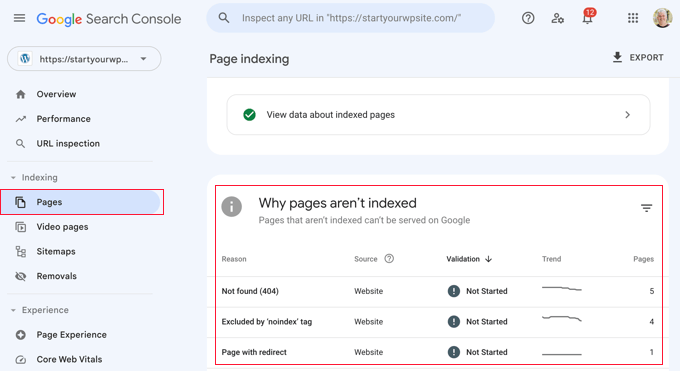
Aby uzyskać więcej informacji, możesz przeczytać naszą listę wskazówek dotyczących korzystania z Google Search Console w celu zwiększenia ruchu w witrynie, która zawiera kilka wskazówek, jak poprawić błędy 404 za pomocą tego narzędzia.
W związku z tym przyjrzyjmy się, jak poprawić wpisy WordPress zwracające błędy 404. Możesz skorzystać z poniższych odnośników, aby przejść bezpośrednio do różnych rozwiązań:
Nie masz czasu na samodzielne poprawki błędów 404? Usługi WPBeginner Pro mogą pomóc! Dzięki naszemu niedrogiemu wsparciu WordPress w nagłych wypadkach możesz zatrudnić ekspertów, którzy poprawią błędy 404, niedziałające linki, problemy z przekierowaniami i wiele więcej. Przestań stresować się problemami z WordPressem i popraw je! Zaplanuj awaryjną obsługę WordPress już dziś!
Metoda 1: Sprawdzenie konfliktów wtyczek lub motywów i problemów z własnym kodem
Czasami wtyczki, motywy lub niestandardowy kod dodany do witryny WordPress mogą zakłócać permalinki lub powodować konflikty, prowadząc do błędów 404. Doświadczyliśmy tego nawet sami podczas testowania narzędzi na naszej stronie demonstracyjnej.
Jednym ze sposobów rozwiązania tego problemu jest tymczasowe wyłączanie wtyczek. Wtyczki mogą czasami zakłócać sposób, w jaki WordPress obsługuje odnośniki.
Po wyłączeniu wtyczek możesz je ponownie aktywować, sprawdzając jednocześnie, czy błąd 404 pojawia się ponownie po włączaniu każdej z nich. Jeśli błąd pojawia się po włączaniu konkretnej wtyczki, to ona może być winowajcą.
Następnie można szybko wyszukać w Google rozwiązania związane z tą wtyczką lub skontaktować się z twórcą wtyczki w celu uzyskania obsługi.
Podobnie, twój motyw WordPress może powodować konflikt.
Aby to sprawdzić, możesz tymczasowo przełączyć się na domyślny motyw WordPress, taki jak Twenty Twenty-Three lub Twenty Twenty-Four. Wystarczy przejść do Wygląd “ Motywy i kliknąć “Włączanie” domyślnego motywu.

Jeśli błąd 404 zniknie z domyślnym motywem, oznacza to potencjalny konflikt z twoim obecnym, aktualnym motywem. Możesz wtedy spróbować rozwiązać problem z motywem lub rozważyć użycie innego motywu.
Możesz sprawdzić nasz ekspercki wybór najpopularniejszych motywów WordPress, aby uzyskać rekomendacje.
Jeśli niedawno wstawiłeś fragmenty kodu do twojej witryny internetowej, mogą występować błędy w kodzie powodujące błędy 404. Przyjrzyj się uważnie dodanemu kodowi i sprawdź, czy możesz zidentyfikować jakieś błędy.
Najbezpieczniejszym sposobem dodawania fragmentów kodu do WordPressa jest użycie wtyczki WPCode. Wtyczka ta pozwala wstawić własny kod bez bezpośredniej pracy z plikami motywu, zmniejszając ryzyko zepsucia twojej witryny internetowej.
Ponadto, gdy WPCode wykryje błąd w twoim kodzie, automatycznie wyłączy fragment kodu i poprosi cię o jego sprawdzenie. Możesz również użyć trybu testowego, aby sprawdzić, czy twój kod działa, zanim prześlesz go do swojej witryny internetowej.
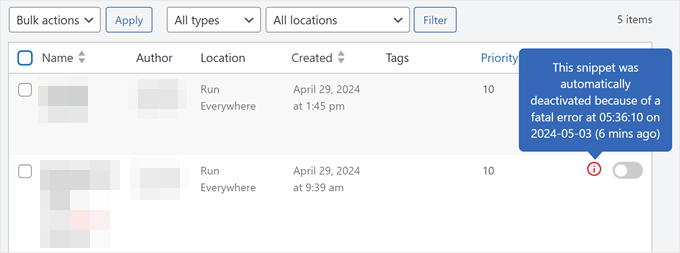
Jeśli żadne z tych rozwiązań nie zadziała, przejdź do następnej metody, w której rozwiążemy problemy z ustawieniami twojego bezpośredniego odnośnika.
Metoda 2: Popraw ustawienia twojego permalinka
Wpisy WordPress mogą zwracać błędy 404 z powodu problemów z regułami przepisywania w twoim pliku .htaccess. W większości przypadków możesz poprawić ten problem, aktualizując ustawienia bezpośredniego odnośnika.
Po prostu przejdź do Ustawienia ” Bezpośrednie odnośniki w twoim panelu administracyjnym WordPress i kliknij przycisk “Zapisz zmiany”.
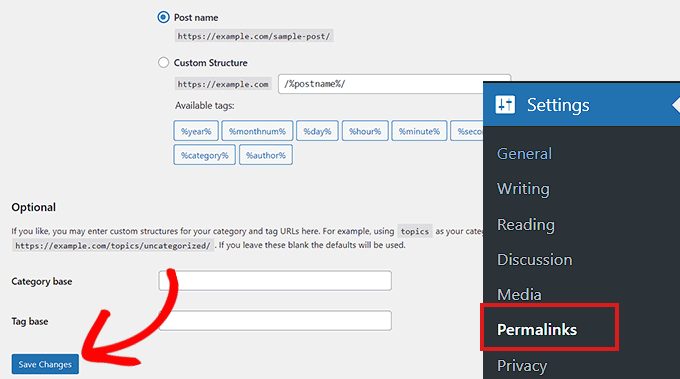
Nie ma potrzeby wprowadzania zmian w samych ustawieniach bezpośrednich odnośników. Zaktualizuje to twoje ustawienia bezpośredniego odnośnika i wyczyści reguły przepisywania.
W większości przypadków rozwiązanie to poprawi błąd 404 wpisów WordPress. Jeśli jednak nie działa ono w twoim przypadku, to prawdopodobnie musisz ręcznie zaktualizować swój plik .htaccess.
Metoda 3: Aktualizacja pliku .htaccess WordPressa
Zanim zaczniesz, upewnij się, że najpierw wykonałeś kopię zapasową twojego pliku .htaccess WordPress. Jeśli coś pójdzie nie tak, możesz łatwo przywrócić oryginalny plik.
Teraz musisz połączyć się z twoim serwerem za pomocą klienta FTP, takiego jak FileZilla lub aplikacji File Manager w kokpicie hostingu WordPress.
Następnie należy znaleźć i edytować plik .htaccess, który znajduje się w tej samej lokalizacji co katalogi takie jak /wp-content/ i /wp-includes/.
Wystarczy kliknąć plik prawym przyciskiem myszy i wybrać opcję “Uprawnienia pliku”.
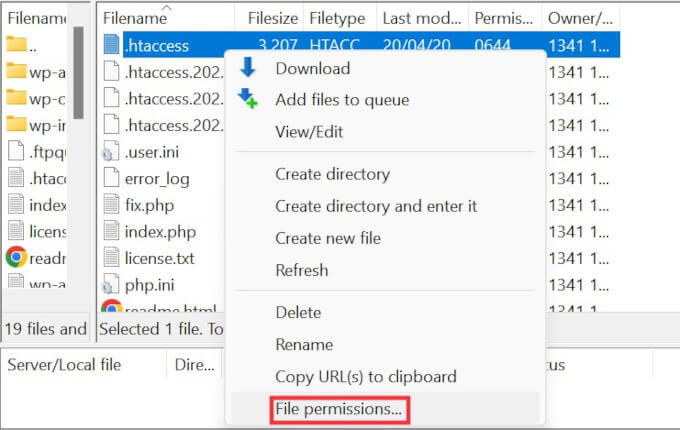
Plik można zapisać, zmieniając jego uprawnienia na 666.
Po prostu wpisz “666” w polu “Wartość liczbowa”, a następnie kliknij “OK”.
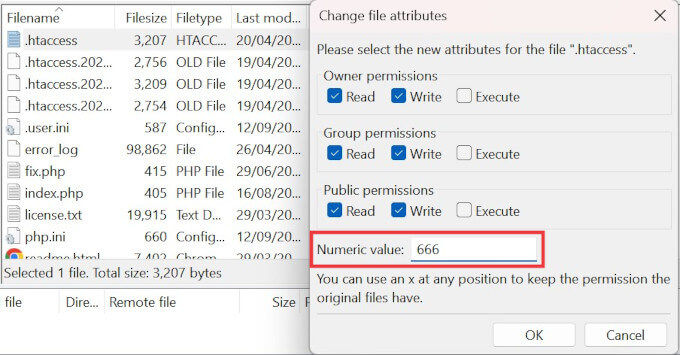
Następnie należy powtórzyć kroki z pierwszej metody naszego poradnika. Po wykonaniu tej czynności nie zapomnij zmienić uprawnień z powrotem na 660.
Można również edytować plik i dodawać do niego kod.
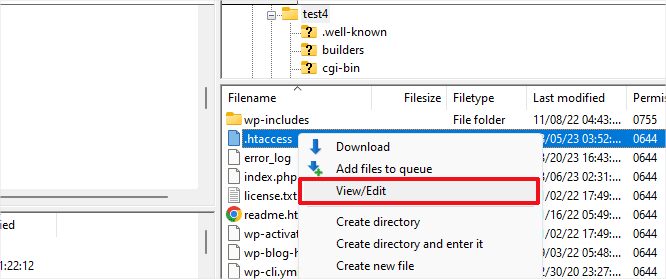
Po otwarciu pliku .htaccess za pomocą edytora tekstu, wystarczy wstawić ten kod:
1 2 3 4 5 6 7 8 9 10 | # BEGIN WordPress<IfModule mod_rewrite.c>RewriteEngine OnRewriteBase /RewriteRule ^index\.php$ - [L]RewriteCond %{REQUEST_FILENAME} !-fRewriteCond %{REQUEST_FILENAME} !-dRewriteRule . /index.php [L]</IfModule># END WordPress |
Metoda 4: Skontaktuj się z dostawcą hostingu
Jeśli żadne z powyższych rozwiązań nie naprawiło błędu 404 zwracającego wpisy WordPress, zalecamy skontaktowanie się z dostawcą hostingu WordPress. Może to być błąd po ich stronie lub mogą oni pomóc w rozwiązaniu problemu.
Zapoznaj się również z naszym przewodnikiem na temat tego, jak prawidłowo poprosić o pomoc techniczną WordPress i ją uzyskać.
Metoda 5: Włącz mod-rewrite (lokalna instalacja WordPress)
Jeśli używasz regionalnego serwera do celów testowych, musisz włączyć mod_rewrite w konfiguracji Apache twojej witryny MAMP, WAMP lub XAMPP.
Pozwoli to WordPressowi na generowanie czystych adresów URL i zapobiegnie błędowi 404 dla wpisów i stron na twoim serwerze lokalnym.
Sposób wykonania tej czynności zależy od używanej platformy. Osoby korzystające z XAMPP mogą otworzyć swój panel sterowania i kliknąć przycisk “Konfiguracja” w ramach działań. Następnie należy wybrać “Apache (httpd.conf)”.
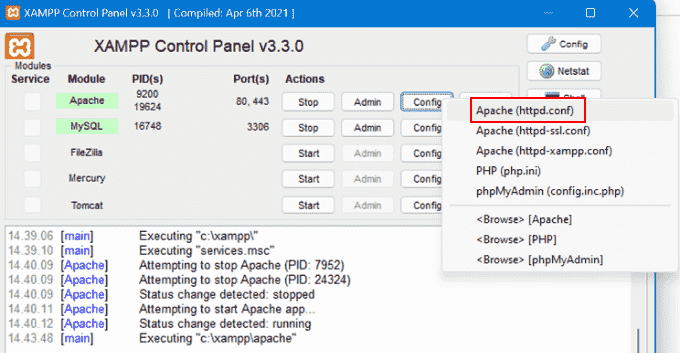
Następnie należy znaleźć linię #LoadModule rewrite_module modules/mod_rewrite.so i usuwać ‘#’, aby ją odkomentować.
Spowoduje to wczytywanie mod_rewrite.
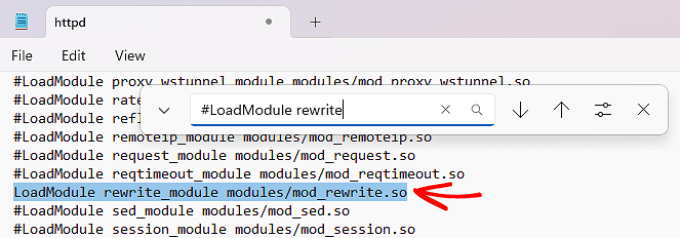
Następnie znajdź wszystkie instancje AllowOverride None i zmień je na AllowOverride All.
Wartość “All” oznacza, że wszystkie dyrektywy mogą zostać zastąpione.
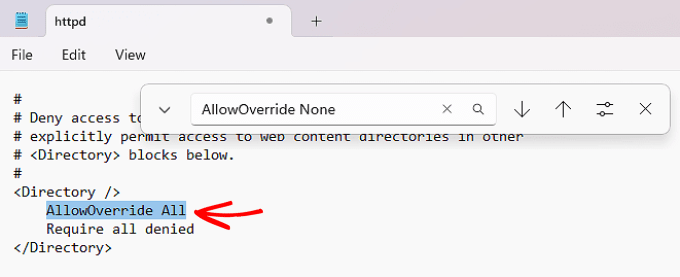
Po zakończeniu można zapisać plik httpd.conf i zamknąć go. Następnie w panelu sterowania XAMPP kliknij “Stop” na module Apache i “Start” ponownie, aby go ponownie uruchomić.
Następnie wróć do kokpitu administratora, aby sprawdzić, czy twoje bezpośrednie odnośniki działają.
Film instruktażowy
Jeśli potrzebujesz instrukcji wizualnych, obejrzyj poniższy film.
Mamy nadzieję, że ten artykuł pomógł Ci rozwiązać problem postów zwracających błędy 404 w WordPress. Możesz również zapoznać się z naszym przewodnikiem po najczęstszych błędach WordPress i sposobach ich poprawki, a także z naszymi eksperckimi propozycjami najlepszych wtyczek WordPress do rozwoju Twojej witryny.
If you liked this article, then please subscribe to our YouTube Channel for WordPress video tutorials. You can also find us on Twitter and Facebook.





Robert
Well, your tip saved me hours of searching – many thanks
Nima Arefi
Thank’s you saved my life :d
Juan
Hello, I have a problem since I migrate the website from localhost to a server, the main page looks good but the menu is not displayed but the links do not work always throws error 404.
They can help me, this is a cause of a migration from a local server.
Marissa
I can’t thank you enough for such a simple tutorial!! Everything else I found made it seem so difficult. I recently switched from http to https and it has been one problem after another..
WPBeginner Support
Hi Marissa,
Glad you found this tutorial helpful. Don’t forget to join us on Twitter for more WordPress tips and tutorials.
Admin
Rick
I didn’t have an .htaccess file so I created one with the info you provided above; then uploaded it and the site works perfectly again. Thanks!
Curtis
Hi I have done all the above and noticed the bit of text to copy and paste was already in there! It still is not working and im stressing out!
Tibi
I’ve done the same thing and nothing changed, the home page still not found
Please contact me if you find a solution
Patrick
Wow. This really saved my bacon. Thank you so much for the tip on simply saving the permalinks page. Incredible advice!
Alexis
hello! i’ve reset permalinks many times to deal with the 404 error. this time when i hit save a file downloaded to my computer: options-permalink.php and the site broke. just got a white screen and each time a file downloaded. finally i got the default permalinks to work but this is not a great solution. does this sound familiar to you? tech support didn’t think it was the .htaccess file but i’m not convinces. moved site from one host to another. any help would be much appreciated.
Mike Birdsall
How do I update settings if I can’t log into the WP admin. I get the 404 error when going to /wp-admin
Kelly
So helpful!! thank you!!!!!!
seun
Hello, please help, i seem not getting solution through this tutorial cos i can’
t access my dashboard, i keep getting this message any site directory i open.
Not Found
The requested URL /index.php was not found on this server.
Additionally, a 404 Not Found error was encountered while trying to use an ErrorDocument to handle the request.
Nukak
if you cannot access your dashboard. your issue is most likely a plugin issue. go to phpAdmin and disable all plugins.
this link might help you https://www.wpbeginner.com/plugins/how-to-deactivate-all-plugins-when-not-able-to-access-wp-admin/
once deactivated and you log back in you can then activiate the plugins that you need. all your initial settings before you got locked out of yur site would still remain in tact. all the best.
Clint
Thank you, just clicking save on my permalink page (which has been customised for years) worked immediately.
Chris Keeble
Perfect!
Clicking Save Changes on Settings > Permalinks works first time.
tamim
Wow! that’s a great solution.
Jason
Hi, I was having the 404 error problem. Homepage works fine, all other links have the 404 error. Tried the method you suggested in wordpress settings permalinks and click save changes but it didn’t work for me.
Saw some post earlier about sync the htaccess file through the webhosting settings page somewhere but don’t really know how to do it. Any advice? Thanks
Mohamad Zidani
Hi
I was using Fv Top Level Cats, when i removed still redirection worked from
example.com/category/tech to
example.com/tech.
i try your solution and it doesn’t work.
Joerg Naussed
the 404 appear right away what happen?
Tamara
That worked!! Thank you
Lijo Jose
Thank you, My problem was solved
Mariana Cervantes
Thank you so much!!!! My problem was fixed with the permalink solution
Michael
If this error is affecting your login page, go to .htaccess and remove:
“deny from all”
“allow from 00.00.00.00”
Matt Kay
Fantastic – I had moved my site from one server to another and started getting worried about 404 errors. The fix worked perfectly – so easy!
Bienvenido
A very simple answer to a hair pulling issue. Thanks a bunch. BTW this issue started after I installed BJ Lazy Loading.
Gail Gardner
Thank you! This did the trick.
Ahmed
Hi, One of my site was hacked. There was few hundreds article inserted. Now those has been removed. Google webmaster console showing those as 404.
How this can affect my site how to fix this?
Thanks
Stephanie
Wow, thank you! This worked perfectly.
Mawuli Tanor
Spot on! On the dot!
First fix worked.
Thanks a lot!
Peter Mazzi
Thanks. pity there’s no rating on this page. *****
David M. Curtis
Thank you for posting this article. I had spent months building a store / blog and today none of my pages or posts were working other than the front home page, all other links were taking me to a 404 error page. I was about to start completely over – re-peat months of work. This article saved my site. Now everything is working again. I can’t thank you enough.
WPBeginner Support
Hi David,
We are glad you found the article helpful Don’t forget to join us on Twitter for more WordPress tips and tutorials.
Don’t forget to join us on Twitter for more WordPress tips and tutorials.
Admin
Robin
Hi there, completely stuck here, not a computer guy at all so it’s all greek to me. my homepage is good but I’ve created another 5 pages such as blog post, services, etc. and every time I try to view the page I’ve just created I get NOT FOUND The requested URL /services/ was not found on this server.” I’ve tried saving changes didn’t make any difference and I have no idea what an FTP is. Any help ? thx
WPBeginner Support
Hey Robin,
Try updating your permalink structure. Simply visit Settings » Permalinks and then click on the save changes button without changing anything.
Admin
Preet Karan
Hi everyone,
i installed yoastseo plugin. i generated the XML site successfully, but when i tested it on google search console it is showing 404 error.
i tried the method listed in article but the problem still persist.
also i need to mention that in the CCpanel there are two files of the same name htaaccess and htaaccess.1 (with the same code written that has been mentioned by article above ); is it normal,
can you help me wth the issue
David
I can’t believe just clicking “Save Changes” worked. Thanks!
jorge
hello there im I would really appreciate help I followed the instructions on saving changes on permalinks not a computer person so do not know how to do the other after is showing me this
Fatal error: Class ‘Epsilon_Editor_Custom_Control’ not found
WPBeginner Support
Hi Jorge,
It looks like a plugin on your website is causing the error. You need to deactivate all plugins installed on your website, and then reactivate them one by one until you find the plugin causing the error. See our guide on how to deactivate all plugins when not able to access wp-admin for detailed instructions.
Admin
yugal joshi
great man..thank you much.. i open my site but its throwing 502 error then 503 error and then lastly 500 error..then i solve the problem of 500 from cpanel threw ur post.
but when i open my post pages its showed 404 error then i googled it and find ur post…thanks…
Bren
In the event this is a new server, or an Apache upgrade you may have to check the following:
Open the httpd.conf ie: /etc/httpd/conf/httpd.conf.
Change the AllowOverride None to AllowOverride All.
Save changes
Restart the Apache server.
Mariyam
Wow, as easy as that, Thank you!
Ashley Adams
Having a little trouble… After I hit save changes on the permalink page, another 404 error popped up.
Katherine
This just saved me hundreds of dollars in help. <3
James V
Quick fix…thanks for the help!
marco
still having problems, not sure what to do, i followed steps above, and get same results. my web host company uses windows 2012 server so no .htaccess file. so many of these help posts refer to .htaccess which windows does not use. they use the web.config file i think, is that correct? please help
marco
I have followed the above steps, but still does not work. I am on windows 2012 R12 server and do not have a .htaccess file, even while in FTP force hidden files to display . are there instructions on how to fix this problem when on windows server
WPBeginner Support
Hey Marco,
First you need to download a backup of your existing web.config file to your computer. After that you need to edit the file on your server and add following rule to the system.webServer element:
<?xml version="1.0"encoding="UTF-8"?><configuration><system.webServer><rewrite><rules><rule name="WordPress Rule"stopProcessing="true"><match url=".*"/><conditions><add input="{REQUEST_FILENAME}"matchType="IsFile"negate="true"/><add input="{REQUEST_FILENAME}"matchType="IsDirectory"negate="true"/></conditions><action type="Rewrite"url="index.php"/></rule></rules></rewrite></system.webServer></configuration>1-click Use in WordPress
Admin
Salami
Hi WPBeginner Support. I have tried all the solutions pasted on this blog to solve the same problem(404 error on wordpress) am confronting now since two days, but i haven’t got it right. Am developing my website with windows platform using wordpress. Please what other thing I should do to solve this problem?
Thanks in anticipation to your response.
Dale
Amazing help thank you! As simple as clicking save!
david c
worked like a charm – thank you thank you!
Tom
Many thanks,
Worked a treat!
Michelle
I want to hug you for all your extremely helpful posts. Thank you very much!!!
Steve Andrews
I migrated a site to, imported the mySQL DB and uploaded the entire file structure of the wordpress directory.
I still got a 404 error for everything but the home page, and re-saving the config in the permalinks section did not work.
What worked for me was renaming the htaccess file on the FTP site to htaccessOLD so it would not be referenced, but I still have it backed up if needed, then I went and saved the permalink options, had to chose what type of link I wanted (IE date, page no or description). Once I saved all the pages were back up and running.
Thanks for the post, it gave me the pointers to find this and fix it.
Rene
I followed the exact steps but unfortunately they don’t work for me. I keep getting errors 404 despite saving my permalink info, removing .htaccess and re-generating it. I am able to view my home page, but as soon as I want to visit a sub page, the error 404 pops up. I also tried switching to WPs default themes, also that doesn’t help. Are there any advices for “advanced” bug solving in case of 404 errors?
WPBeginner Support
Hey Rene,
Try updating WordPress URLs by visiting the Settings > General page. Make sure that your site and WordPress URL are the same.
Admin
sampurna
Hey. I have a little problem with 404. I had changed the permalink of a single post. now for a certain keyword google is displaying the same post in two different positions with same title but different url and one has 404 error. please help.
WPBeginner Support
Hi Sampurna,
You can setup a redirect for the URL returning 404 error. See our guide on how to setup redirects in WordPress.
Admin
Rene
Not needed, problem is fixed. I coincidentally found out that my host is reading a different .htaccess file than the one that WP generates. So a “sync” had to be done via their webhosting portal, that was all. Now it works, thanks a lot anyway and perhaps this alternative solution is still useful for other to know that may have a similar setup by their host. Rgds!
Carey
Same here! Needed to ‘sync’ the htaccess file through the webhosting settings page somewhere… thanks for the tip!
Rajinder S. Gill
This was quick. Thank you
Lois
You saved my life today. I was at the verge of crying because after creating a post, I was unable to read the post. it returned 404 error. I eearched several websites for answers but your post was well explicit and once I changed the permalink structure, it worked. Thank you thank you.
Kaylee
I’m still now following at where you exactly change the permissions at. Could you please explain?
Mike lavie
The solution: Login to your server using FTP, and modify the folders like /wp-content/ and /wp-includes/ are located. The easiest thing you can do is to temporarily make the file writeable by changing the permissions to 777. Then repeat the original solution.
Go to Settings » Permalinks, and simply click on Save Changes button.
Don’t forget to change the permissions back to 755 ( /wp-content/ and /wp-includes/ ).
I do it for is perfect now!
Lukas
Great, that help a lot!